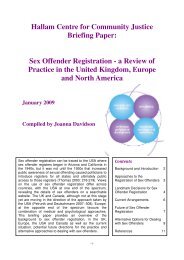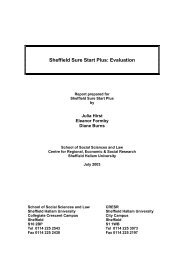The exercise of judicial discretion in rent arrears cases - Sheffield ...
The exercise of judicial discretion in rent arrears cases - Sheffield ...
The exercise of judicial discretion in rent arrears cases - Sheffield ...
You also want an ePaper? Increase the reach of your titles
YUMPU automatically turns print PDFs into web optimized ePapers that Google loves.
<strong>The</strong> nature <strong>of</strong> the landlord became an important factor to balance aga<strong>in</strong>st the occupiers’<br />
rights:<br />
“Local authorities and a lot <strong>of</strong> the hous<strong>in</strong>g associations really can’t fulfil their<br />
obligations as they would like to, because they simply haven’t got the means to do it<br />
[…]. If they didn’t have various people ow<strong>in</strong>g them quite a lot <strong>of</strong> money, there would<br />
be more to do the repairs.” (DJ O)<br />
Second, our <strong>in</strong>terviewees expressed concern about the rights <strong>of</strong> the occupier who had not<br />
been pay<strong>in</strong>g their <strong>rent</strong> aga<strong>in</strong>st the needs <strong>of</strong> others on the wait<strong>in</strong>g list. For DJ W, this was a<br />
“subsidiary consideration” and “it’s just my slight concern that perhaps I should be more<br />
bullish…particularly with the more persistent defaulters”. On the other hand, DJ U would ask<br />
<strong>of</strong> some occupiers:<br />
“‘Look, if you’ve chosen not to pay it then why do you expect the court to help you<br />
now?’ If there’s a lot <strong>of</strong> people scream<strong>in</strong>g out for accommodation, will<strong>in</strong>g to pay for it,<br />
why should I give priority to people who are not prepared to do so. Not are unable to<br />
do so, but not prepared to."<br />
Aga<strong>in</strong>, this factor could be deployed at diffe<strong>rent</strong> parts <strong>of</strong> the process. For example, one<br />
<strong>in</strong>terviewee used this <strong>in</strong> discussion <strong>of</strong> scenario 7 as a scare tactic:<br />
“‘Look, £4.50 a week, it’s not a k<strong>in</strong>g’s ransom, and you’re work<strong>in</strong>g. You’ve got to pay<br />
it otherwise you’ve got to go.’ And then, if the landlord’s there I <strong>in</strong>variably ask, ‘How<br />
many people on the hous<strong>in</strong>g list?’ A scare tactic to, not to frighten her, but to make<br />
her realise that if she wants to stay she’s be<strong>in</strong>g housed for £4.50, you know, 60p a<br />
day is not a lot to ask.” (DJ P)<br />
This factor could, however, be used to sw<strong>in</strong>g the other way, <strong>in</strong> favour <strong>of</strong> the tenant. At least,<br />
the social obligation implied <strong>in</strong> the role <strong>of</strong> ‘social landlord’ would not outweigh the duties to<br />
the occupier. Thus, for example, it was said that if you evict a mother and her children, you<br />
are creat<strong>in</strong>g more problems <strong>in</strong> society at large:<br />
“than you are try<strong>in</strong>g to deal with the particular problem <strong>of</strong> them not pay<strong>in</strong>g the <strong>rent</strong>,<br />
and other people who would be good tenants be<strong>in</strong>g <strong>in</strong> the wait<strong>in</strong>g list” (DJ I)<br />
F<strong>in</strong>ally, it was said that, where tenants <strong>of</strong> social landlords were evicted, the problem was that<br />
the social landlord – or, rather, the local authority – would be required to re-house the tenant<br />
at some considerable cost. Although some <strong>in</strong>terviewees recognised the likelihood <strong>of</strong> a<br />
f<strong>in</strong>d<strong>in</strong>g <strong>of</strong> <strong>in</strong>tentional homelessness, others raised concerns over the costs <strong>of</strong> rehous<strong>in</strong>g,<br />
us<strong>in</strong>g this as a technique to deny possession to a social landlord:<br />
“But the local authority is really the end <strong>of</strong> the l<strong>in</strong>e <strong>in</strong> terms <strong>of</strong> hous<strong>in</strong>g. And they’re<br />
go<strong>in</strong>g to be the ones that pick up the pieces when somebody presents with a priority<br />
need. So I th<strong>in</strong>k that’s why, I suppose, I take a slightly diffe<strong>rent</strong> [approach], I say,<br />
‘Look, hang on, you know, where’s this family go<strong>in</strong>g to go? You’re go<strong>in</strong>g to have to<br />
pick up the pieces anyway’.” (DJ H)<br />
53
















